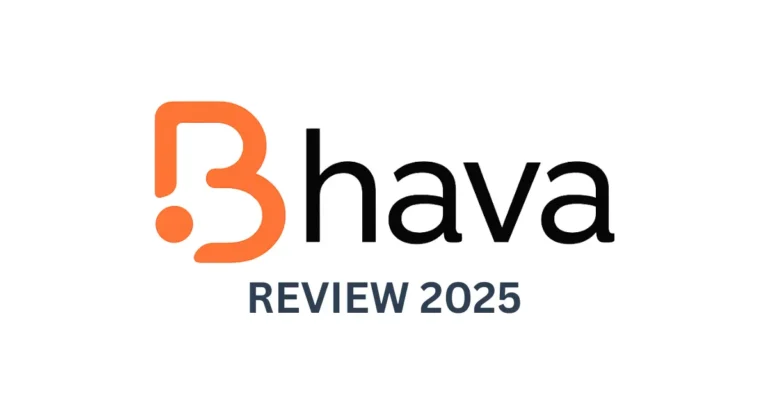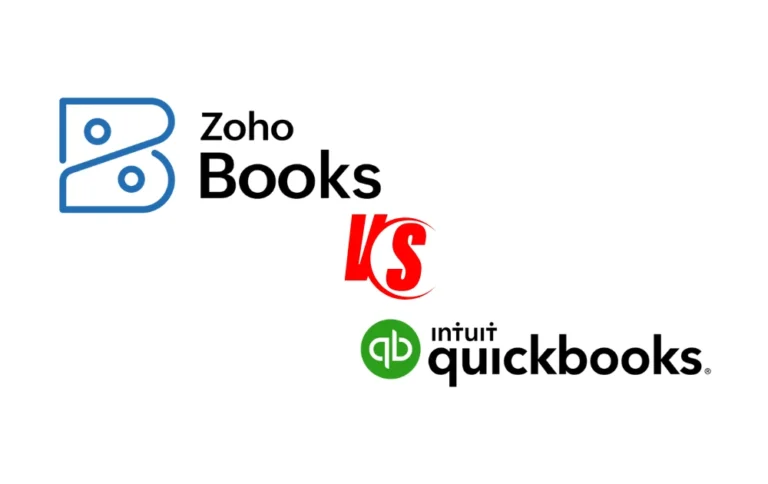What Is Zoho? 45+ Apps for $37/Month (2025 Review)
If you’ve been searching for business software lately, you’ve probably stumbled across Zoho. Maybe you saw it compared to QuickBooks, Salesforce, or HubSpot. Maybe a colleague mentioned it. Or maybe you’re just tired of juggling ten different subscriptions and wondering if there’s a better way.
Here’s what I’ve learned after spending years testing business software: Zoho is one of the most underrated technology decisions you can make for your business—and most people have no idea what they’re missing.
Let me break down exactly what Zoho is, why it matters, and whether it’s the right choice for your business.
What Exactly Is Zoho?
Zoho is a comprehensive cloud software suite that provides 45+ integrated business applications designed to run your entire company from a single platform. Think of it as an operating system for your business—everything from customer relationship management (CRM) and accounting to email marketing, project management, HR, and even custom app development.
Founded in 1996 (yes, they’ve been around for nearly 30 years), Zoho Corporation has grown into one of the most successful privately-held software companies in the world, serving over 100 million users across 150+ countries.
But here’s what makes Zoho different from every other business software company: they actually walk the walk when it comes to privacy, sustainability, and long-term thinking.
What Makes Zoho Fundamentally Different
They Don’t Sell Your Data (And Never Will)
In an era where most “free” software makes money by selling your data to advertisers, Zoho operates on a radically different model. They make money exclusively from software licenses—not ads, not data mining, not surveillance capitalism.
I’ve reviewed hundreds of software products, and I can count on one hand the companies that truly respect user privacy like Zoho does. They don’t just say it in their privacy policy—they’ve built their entire business model around it.

They Own Their Entire Technology Stack
Most software companies rent servers from Amazon (AWS), Microsoft (Azure), or Google Cloud. Not Zoho. They own and operate their own data centers globally. This means:
- Better data security and privacy control
- No dependency on competitors’ infrastructure
- Lower costs that get passed to customers
- Faster innovation without waiting on third parties
This level of vertical integration is almost unheard of in the SaaS world.
They’re Profitable and Play the Long Game
Unlike venture-backed startups burning through cash hoping to get acquired, Zoho has been profitable for decades. They’re not going to disappear overnight, get acquired by a competitor, or suddenly 10x their prices because investors want an exit.
When I recommend software to businesses, sustainability matters. I’ve seen too many companies invest in tools that shut down two years later.
Zoho One: The Operating System for Business
The flagship product—and the one I recommend most often—is Zoho One. It’s essentially a bundle of 45+ enterprise-grade applications for one unified price.
Instead of paying separately for:
- Salesforce or HubSpot (CRM)
- QuickBooks (accounting)
- Mailchimp (email marketing)
- Asana (project management)
- BambooHR (human resources)
- Zendesk (customer support)
- And dozens of other tools…
You get all of it in one integrated suite. And here’s the kicker: it costs a fraction of what you’d pay for those individual tools.
Zoho One Pricing (2025)
Zoho offers two main plans:
Essentials Plan:
- 15+ core business apps
- Perfect for small businesses starting their digital transformation
- Includes CRM, accounting, email, projects, and more
- Great entry point for companies new to business software
Standard Plan:
- 45+ applications with advanced features
- AI-powered analytics (Zia, their AI assistant)
- Custom app development platform
- Mobile device management
- Flexible pricing: Pay per user monthly or get the “All-Employee” rate
All-Employee Pricing (Standard Plan):
- $90 per user/month (billed annually) or $105 per user/month (billed monthly)
- No minimum user requirement
- Includes every application in the Zoho ecosystem
All-Employee Discount:
- If you purchase licenses for your entire team, pricing can drop to as low as $37 per user per month
- This is the best value if you’re committed to using Zoho across your organization
Let me put that in perspective: I’ve seen companies spend $300-500 per user/month cobbling together separate tools. With Zoho One, you’re looking at $37-90/month for MORE functionality, better integration, and a unified experience.
Key Product Categories: What Can You Actually Do With Zoho?
Let me walk you through the major categories and why they matter:
Sales & Marketing
Zoho CRM is the crown jewel—a full-featured customer relationship management system that rivals Salesforce at a fraction of the cost. I’ve used both extensively, and for 90% of businesses, Zoho CRM does everything you need:
- Lead capture and nurturing
- Sales pipeline management
- Email integration
- Workflow automation
- AI-powered insights (Zia predicts deal closures, suggests next actions, and more)

Zoho Campaigns handles email marketing, Social manages your social media, and SalesIQ provides live chat and visitor tracking on your website.
Real-world example: A mid-sized B2B company I consulted for was paying $18,000/year for Salesforce plus another $5,000 for marketing tools. They switched to Zoho One for $3,600/year total (10 employees). That’s 84% savings with more features.
For a detailed comparison, check out our Zoho CRM vs Salesforce guide.
Finance & Operations
Zoho Books is a robust accounting solution that handles:
- Invoicing and billing
- Expense tracking
- Bank reconciliation
- Financial reporting
- Multi-currency support
- GST/VAT compliance

Zoho Inventory manages stock, warehouses, and fulfillment. Zoho Expense streamlines expense reporting. Zoho Analytics gives you powerful business intelligence across all your data.
Learn more in our Zoho Books vs QuickBooks comparison.
Collaboration & Productivity
This is where Zoho really shines for remote and hybrid teams:
- Zoho Cliq – Team messaging (think Slack)
- Zoho Meeting – Video conferencing (think Zoom)
- Zoho Mail – Business email hosting
- Zoho WorkDrive – Cloud storage and file sharing
- Zoho Writer/Sheet/Show – Office suite (think Google Workspace or Microsoft Office)
You can literally replace your entire productivity stack with Zoho applications that talk to each other seamlessly.
Project Management
Zoho Projects offers Gantt charts, task dependencies, time tracking, and collaboration tools. Zoho Sprints is purpose-built for agile teams doing software development.
I’ve used Asana, Monday.com, and Zoho Projects extensively. For most businesses, Zoho Projects offers 90% of the features at 20% of the cost—and it integrates natively with your CRM, accounting, and everything else.
Human Resources
Zoho People handles employee onboarding, time tracking, leave management, and performance reviews. Zoho Recruit manages your hiring pipeline. Zoho Expense tracks employee expenses and reimbursements.
For growing companies, having your HR data connected to your finance and operations systems is a game-changer.
Customer Support
Zoho Desk is a full-featured helpdesk and ticketing system. It now includes Zia AI features like ticket summaries, reply assistance, and content generation to help agents stay productive.
Zoho Assist provides remote support capabilities—perfect if you have IT staff supporting employees or customers.
Custom Applications
Here’s something most people don’t realize: Zoho Creator lets you build custom applications without extensive coding knowledge. Need a custom workflow, database, or internal tool? You can build it right inside the Zoho ecosystem.
I’ve seen companies build custom inventory systems, client portals, and workflow automation tools using Creator—things that would have cost $50,000+ to develop from scratch.
Zoho vs. Traditional Software Stacks: A Real Comparison
Let me show you what a traditional software stack looks like vs. Zoho One:
| Software Category | Traditional Stack Cost | Zoho One Equivalent |
|---|---|---|
| CRM (Salesforce) | $150/user/month | Zoho CRM (included) |
| Accounting (QuickBooks) | $90/month | Zoho Books (included) |
| Email Marketing (Mailchimp) | $299/month | Zoho Campaigns (included) |
| Team Chat (Slack) | $12.50/user/month | Zoho Cliq (included) |
| Video Conferencing (Zoom) | $15/user/month | Zoho Meeting (included) |
| Project Management (Asana) | $24.99/user/month | Zoho Projects (included) |
| Productivity Suite (Google Workspace) | $18/user/month | Zoho Workplace (included) |
Total for 10 users: ~$4,000+/month = $48,000+/year
Zoho One (All-Employee Pricing):
- Everything above + 35 more apps
- 10 users × $90/month = $900/month = $10,800/year
That’s a savings of $37,200 per year while getting MORE functionality and better integration. And if you qualify for the all-employee discount, it drops to just $4,440/year.
The math is absurd. But here’s what really matters: integration.
When you use ten different tools, they don’t talk to each other smoothly. You’re constantly importing/exporting CSVs, dealing with data sync issues, and paying for integration tools like Zapier ($240+/year) just to connect everything.
With Zoho, everything is natively integrated. Your CRM knows about your accounting. Your projects are connected to your timesheets. Your support tickets link to customer records. This isn’t just cheaper—it’s how business software should work.
For more detailed comparisons, see our Zoho vs HubSpot analysis.
Who Should Use Zoho?
After years of testing and recommending business software, here’s my honest assessment:
Zoho Is Perfect For:
- Small to medium businesses (5-500 employees) – You get enterprise-level features without enterprise-level complexity or cost
- Startups trying to operate lean – Why pay for ten subscriptions when one does it all?
- Companies tired of integration headaches – Everything works together out of the box
- Privacy-conscious organizations – No data mining, no selling your information
- B2B companies – The CRM, marketing, and sales tools are incredibly powerful for business-to-business sales
- Service businesses – Consulting, agencies, IT services—Zoho handles project management, time tracking, billing, and client communication beautifully
- International companies – Multi-currency support, global data centers, and compliance in 150+ countries
Zoho Might Not Be Ideal For:
- Enterprise-level corporations (5,000+ employees) – You might need Salesforce’s enterprise features and dedicated support
- Companies needing ultra-specialized industry tools – Zoho is broad but not industry-specific (though you can customize heavily)
- Organizations deeply invested in Microsoft/Google ecosystems – If you’re all-in on Microsoft 365 or Google Workspace, switching everything might not make sense
- Teams that need best-in-class for one specific function – If you need the absolute best email marketing tool on the planet, something like ActiveCampaign might edge out Zoho Campaigns. But you lose integration benefits.
My Real-World Experience and Honest Assessment
I’ve been evaluating business software professionally for over 15 years. I’ve tested Salesforce, HubSpot, Microsoft Dynamics, SAP, Oracle, and dozens of other platforms.
Here’s my take: For 80% of businesses, Zoho One is the smartest technology investment you can make.
It’s not perfect. The user interface isn’t as polished as some competitors. The learning curve can be steep because there are so many features. Customer support varies in quality depending on where you are.
But the value proposition is undeniable. You’re getting enterprise-grade software at small-business prices, built by a company that actually respects your privacy and plays the long game.
I’ve personally recommended Zoho to 20+ businesses over the past five years. Every single one has saved money. Most have improved their operations significantly. None have regretted the switch.
Getting Started: Your Next Steps
If you’re considering Zoho, here’s exactly what I recommend:
Start with the free trial
Zoho offers a 30-day free trial of Zoho One with no credit card required. This gives you full access to test everything.
Focus on your pain points first
Don’t try to implement all 45 apps at once. Start with the tools that solve your biggest problems:
- Need better customer management? Start with Zoho CRM
- Drowning in spreadsheets? Start with Zoho Books
- Project chaos? Start with Zoho Projects
Take advantage of implementation support
Zoho offers:
- Onboarding sessions – Guided setup for your IT team
- Jumpstart services – Professional setup to get you running quickly
- Partner network – Certified consultants who specialize in Zoho implementation
Join the Zoho community
There’s a massive community of Zoho users sharing tips, templates, and best practices. The forums are incredibly active and helpful.
Frequently Asked Questions
Is Zoho suitable for small businesses?
Yes, Zoho is particularly well-suited for small businesses. The Essentials Plan provides 15+ core applications at an affordable price point, and you can start with just a few users. The all-employee discount makes it even more cost-effective, potentially dropping to $37 per user per month when you commit to using it across your entire team.
How does Zoho pricing compare to competitors?
Zoho One typically costs 70-80% less than purchasing equivalent tools separately. For example, a 10-person team using traditional software (Salesforce, QuickBooks, Mailchimp, etc.) might pay $48,000+ per year, while Zoho One costs $10,800/year for the same functionality—potentially dropping to $4,440/year with the all-employee discount.
Does Zoho sell my data?
No, Zoho does not sell user data. Unlike many “free” software companies that monetize through advertising and data sales, Zoho’s business model is based exclusively on software subscriptions. They own their own data centers and infrastructure, giving them complete control over data privacy and security.
Can I integrate Zoho with other tools I already use?
Yes, Zoho offers extensive integration capabilities through its marketplace and API. While the greatest benefit comes from using Zoho’s integrated ecosystem, you can connect external tools when needed. However, the primary advantage of Zoho is that most tools are already integrated natively within the platform.
Is there a learning curve with Zoho?
Yes, there is a learning curve, particularly because Zoho offers so many features across 45+ applications. However, you don’t need to learn everything at once. Start with the tools that address your immediate needs, and Zoho provides onboarding sessions, documentation, and a large community to help. The 30-day free trial gives you plenty of time to explore.
What’s the difference between Zoho One and individual Zoho apps?
Zoho One is a bundled suite that includes all 45+ Zoho applications for one price, while individual apps can be purchased separately. If you only need one or two tools (like just Zoho CRM), buying individually might make sense. However, if you need multiple tools, Zoho One almost always provides better value and deeper integration between applications.
Final Thoughts: Is Zoho Worth It?
Let me be direct: Yes, Zoho is absolutely worth it for most businesses.
The combination of breadth (45+ apps), depth (enterprise-grade features), integration (everything works together), and price (a fraction of alternatives) is unmatched in the market.
But more than that, I respect what Zoho stands for as a company. In a world where tech companies treat users as products to be monetized, Zoho treats customers as customers. They’re building for the long term, investing in R&D, respecting privacy, and creating genuinely useful products.
If you’re running a business and you’re not at least evaluating Zoho, you’re probably overpaying for software and dealing with unnecessary complexity.
The 30-day free trial is risk-free. The potential savings are massive. The productivity gains are real.
Want to compare Zoho to specific alternatives? Check out my detailed comparisons:
Disclosure: This article contains affiliate links to Zoho. If you sign up through these links, I may earn a commission at no additional cost to you. I only recommend products I’ve personally tested and genuinely believe provide value. My opinions remain my own and are not influenced by affiliate relationships.







